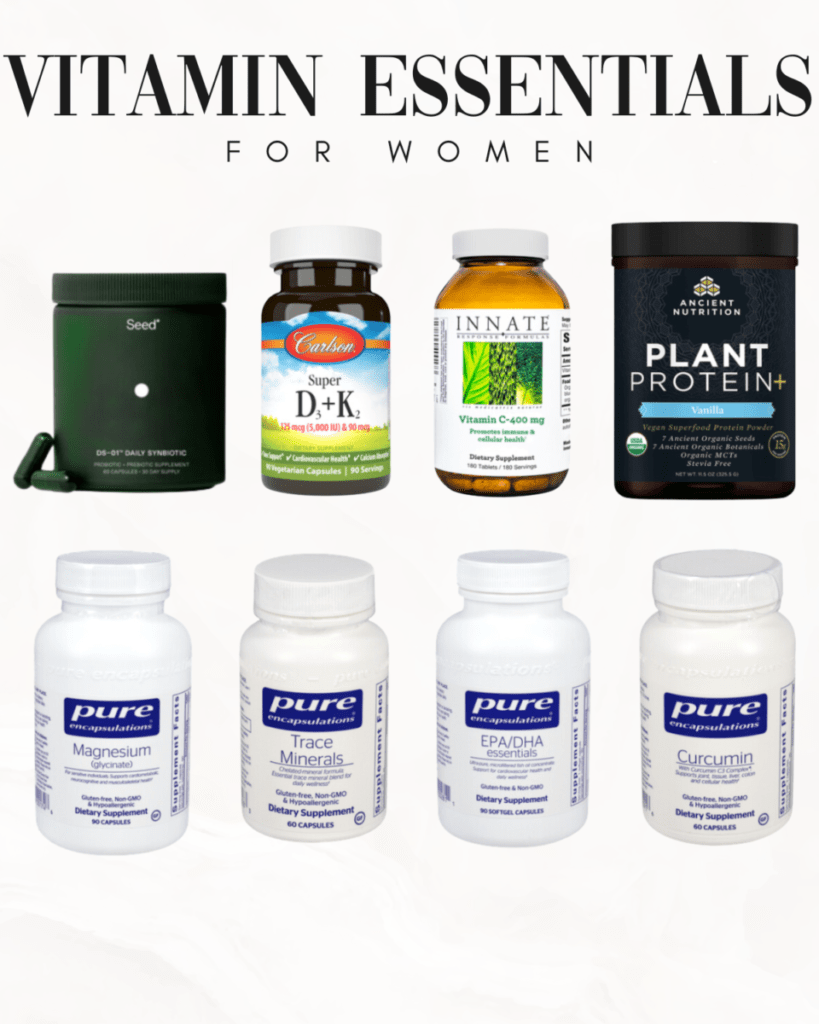
What supplements are right for you? Should you take a daily multivitamin? Fish oil? A probiotic? Magnesium? Many wonder what essential supplements are right for women. While health gurus claim certain supplements are the cure-all, conventional health professionals often warn of the dangers. So where’s the truth? Honestly, it’s somewhere in between. Supplements should not be a replacement for a healthy diet. They fill in the gaps and act like insurance. We should be getting most of our vitamins and minerals from a well-balanced diet high in nutrient-dense foods. “Eat the rainbow.”
Everyone is different and each person’s needs are different. It’s a good idea to have annual bloodwork and occasional mineral testing to see your deficiencies. I am constantly researching this topic and always keeping my eye open for new and better vitamins. As research changes and updates, I will update here as well. Below are the essential supplements for women that I, an integrative nutritionist, believe are most important. At the end of this post, you’ll find where I buy the supplements and brands I recommend to my clients.
Multi-Vitamin/Multi-Mineral
A good multivitamin provides overall support, and protection and covers the bases. I encourage a whole food-based multivitamin. Preferably non-gmo, organic, free of dyes, additives, coloring, and also third-party tested.
Fish Oil/Omega 3 Fats
Omega 3 Fats have been shown to help prevent heart disease and stroke, reduce inflammation, improve mood and focus, and may prevent neurological diseases. It’s important to make sure your fish oil is what it says it is. Many fish oils on the market are rancid, processed, and contain contaminants. A good source is very important for fish oils.
Vitamin D3
“Vitamin D helps the body absorb and retain calcium & phosphorus; both are critical for building bone. Vitamin D can reduce cancer cell growth, help control infections and reduce inflammation.” Although we get Vitamin D from the sun, it’s often not enough. It’s a good idea to get tested by a licensed medical professional before supplementing, so you know how much you need. I personally love being outside and I typically get plenty of natural vitamin d from the sun during the warm months. I only supplement with vitamin D3 in the cooler months when I am indoors more often.
Magnesium
Magnesium supports healthy bones, restful sleep, relaxed muscles, regularity, and a balanced mood. There are several types of magnesium and many get confused about which type to take. Magnesium glycinate is the most bioavailable and absorbable form of magnesium. It is most recommended by health professionals. However, if you struggle with constipation, magnesium citrate may be a better fit for you. It is also easily absorbed like glycinate. I personally take anywhere from 400-600mg of magnesium citrate at night as directed by my integrative doctor. I would personally stay away from magnesium oxide as it can induce diarrhea and has a poor absorption rate. This article explains the different types of magnesium.
Probiotic
Probiotics are live microorganisms that can be consumed through fermented foods or supplements.
Studies on the importance of gut health continue to grow. An unhealthy gut has been linked to neurological disorders, digestive disorders, suppressed immune systems, skin problems, poor nutrient absorption, allergies, poor blood sugar regulation, and the list goes on. Many health professionals say if you want to improve your health, improve your gut. A good probiotic can be very important, however, this is very bio-individual. Most studies showed benefits from taking anywhere from 1 billion to 100 billion live organisms or colony-forming units (CFU) per day. The type of strain that is right for a person can sometimes be very bio-individual as well. We also now know that prebiotics are just as important as probiotics. You can get prebiotics and probiotics through supplements or food. Live probiotic cultures can be found in fermented foods, such as yogurt, kefir, pickled vegetables, tempeh, miso, kimchi, and sauerkraut. Prebiotics are in foods like chicory root, asparagus, apples, bananas, garlic, onion, and more. While it’s important to supplement with probiotics occasionally, it’s also important to limit inflammatory foods such as fried foods, too much gluten, red meat and dairy, refined grains, processed meats, sodas etc.. and consume plenty of fiber-rich, colorful vegetables. The probiotics I take and recommend to my clients include soil-based probiotics and prebiotics for optimum absorption.
Other Supplements That May Be Beneficial for Women
Curcumin
Curcumin is the main active ingredient in turmeric and it has been shown to reduce inflammation. Research suggests that curcumin can help in the management of oxidative and inflammatory conditions, metabolic syndrome, arthritis, anxiety, and hyperlipidemia. I personally take this daily under the instruction of my integrative practitioner.
Vitamin C
Vitamin C is an essential supplement I add to my regimen in the winter. Vitamin C boosts the immune system, therefore, helps you fight against colds, flu, and other viruses floating around during the cooler months.
Creatine
Creatine is a substance found naturally in muscle cells. It helps your muscles produce energy during weight training or high-intensity exercise. Some believe that creatine is unsafe and can have negative side effects. However, that’s old news. Recent studies debunk those old claims. Taking creatine can actually aid in weight loss as well. It helps your body build lean muscle mass and muscle tissue burns more calories than fatty tissue. Therefore, in a roundabout way, it can help with weight loss. See this article for more info and studies on creatine. Does it matter which type of creatine you take? I believe so. I suggest a clean, third-party-tested, form of creatine monohydrate. Creatine monohydrate has been extensively studied for much longer than other versions of creatine and is widely considered safe. This article by Healthline does a good job of laying out all the research around creatine.
Melatonin
Melatonin is not a supplement to be taken on a regular basis. However, it’s definitely a supplement we keep in stock in our wellness cabinet. Our bodies usually promote enough melatonin, but evidence suggests that melatonin supplements can be used for short-term use. Melatonin can be used to treat delayed sleep phase, circadian rhythm sleep disorders in the blind, insomnia, jet lag, and sleep disorders in children. It should be treated as a sleeping pill and under a doctor’s supervision. We personally use melatonin when we are sick and rest is essential for healing or when traveling and good quality sleep may be harder to achieve.
Are All Supplements on the Market Safe and Regulated?
Hardly. The popularity and marketing of supplements are growing rapidly and the US supplement industry is basically the wild wild west. Many supplements are classified as food products, therefore there is little regulation around them. A 2018 study in the journal JAMA found that between 2007 and 2016, the FDA had identified 746 dietary supplements adulterated with pharmaceuticals and contaminates, yet voluntary recalls were issued for only 48 percent of them, and the majority of these tainted supplements remained on the market. The majority of dietary supplement ingredients are put on the market without any safety evaluation. Therefore, it’s important you do your research before just buying any supplements.
What to Look for When Searching for High Quality, Reliable Supplements.
When looking for good, high-quality, reliable supplements, look for third-party testing from the company. Keep it simple. Typically, the fewer the ingredients, the better. Beware of inflated claims. If it seems too good to be true, it probably is. Buy from reputable sources. As an integrative nutritionist, I’m even pickier when it comes to my supplements and the supplements I recommend to my clients. I want them third-party tested, with the purest ingredients possible, and by a trustworthy company.
Supplement Brands I Trust and Recommend to My Clients
Fullscript is an online dispensary that functional practitioners use to prescribe clients supplements and protocols. It carries professional-grade supplements. Each brand and product offered in Fullscript must meet strict quality, purity, label accuracy, and safety standards. This is why I choose Fullscript as the source of my own personal supplements and supplements for my clients. There is a variety of different trustworthy brands like Thorne, Pure Encapsulations, Innate, and more that I gather from Fullscript for myself and my clients.
Supplements I Take as an Integrative Nutritionist
The morning after my first meal: Multi-vitamin, Fish Oil, and Curcumin. In the winter months, I supplement with Vitamin D3 +K2 and Vitamin C as well.
Mid-Day with my smoothie or protein shake, I take creatine monohydrate. (Sometimes I’ll just throw it in a cup of water with protein powder if I’m in a rush).
The evening after dinner: Magnesium 400-600mg.
Note: I also take a few other supplements that are bio-individual to me, like DIM and Liver-GI Detox, which were recommended by my functional medicine practitioners and partners. I also only take a probiotic occasionally now, as I have worked hard to heal my gut through years of probiotics, fermented foods, and limiting inflammatory foods. If you are interested in functional medicine services, reach out and I’d be happy to connect you with my partners and practitioners.
*All these supplements are listed under the Women’s Essential Supplements protocol in my dispensary.
As an integrative nutritionist, I’m able to offer my clients, subscribers, friends, and family 15% off professional-grade, third-party-tested supplements when buying through my Fullscript dispensary.

Once you get on Fullscript, all you need to do is create an account and then you can shop these products at 15% off at any time. You can create your own cart within Fullscript and add other supplements that may have been recommended to you by a doctor or practitioner.
Disclaimer: I am not a doctor. you should always consult with a medical professional before taking any sort of supplement. The customer assumes and accepts full responsibility, liability, and assumes all risk when taking any supplement.

[…] To see what vitamins and supplements I personally take, head on over to this blog post, Essential supplements for women. […]